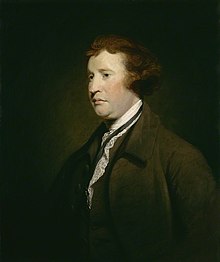एडमण्ड बर्क
एडमण्ड बर्क (12 जनवरी [नशै] 1730[1] – 9 जुलाई 1797) डबलिन में पैदा हुए एक आयरिश[2][3] राजनेता थे, और साथ ही वे एक लेखक, वक्ता, राजनीतिक सिद्धांतवादी और दार्शनिक भी थे। 1750 में लंदन आने के बाद, वे व्हिग पार्टी के साथ 1766 और 1794 के बीच हाउस ऑफ कॉमन्स में सांसद के रूप में सेवारत थे।

सन्दर्भ
संपादित करें- ↑ The exact year of his birth is the subject of a great deal of controversy; 1728, 1729, and 1730 have been proposed. The month and day of his birth also are subject to question, a problem compounded by the Julian–Gregorian changeover in 1752, during his lifetime. For a fuller treatment of the question, see F. P. Lock, Edmund Burke. Volume I: 1730–1784 (Clarendon Press, 1999), pp. 16–17. Conor Cruise O'Brien (2008; p. 14) questions Burke's birthplace as having been in Dublin, arguing in favour of Shanballymore, Co. Cork (in the house of his uncle, James Nagle).
- ↑ Clark 2001, p. 25: "Edmund Burke was an Irishman, born in Dublin but in an age before 'Celtic nationalism' had been constructed to make Irishness and Englishness incompatible: he was therefore free also to describe himself, without misrepresentation, as 'a loyalist being loyal to England' to denote his membership of the wider polity. He never attempted to disguise his Irishness (as some ambitious Scots in eighteenth-century England tried to anglicise their accents), did what he could in the Commons to promote the interests of his native country and was bitterly opposed to the Penal Laws against Irish Catholics."
- ↑ Hitchens, Christopher (April 2004). "Reactionary Prophet". The Atlantic. Washington. मूल से 13 अक्तूबर 2013 को पुरालेखित. अभिगमन तिथि 23 मार्च 2018.
Edmund Burke was neither an Englishman nor a Tory. He was an Irishman, probably a Catholic Irishman at that (even if perhaps a secret sympathiser), and for the greater part of his life he upheld the more liberal principles of the Whig faction.